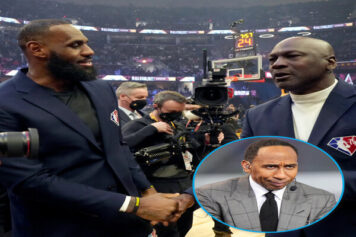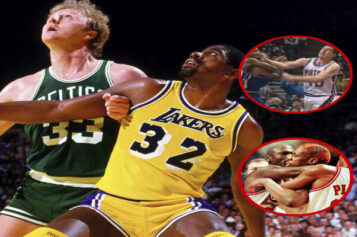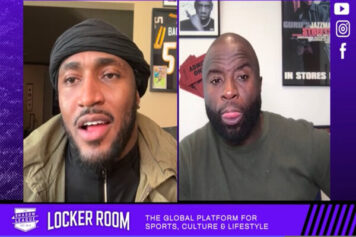The league’s power brokers are lining up Anthony Davis and introducing folks to how business will be conducted by the NBA’s new Black power movement.
The recent Anthony Davis trade request, via his agent Rich Paul of Klutch Sports Group, is another example of African-American superstars leveraging their understanding of free agency, the power of social media, and the value of their talents to create a situation where they deal with owners from a position of power.
3 Possible Trade Destinations For Anthony Davis – The Shadow League https://t.co/YAvi01KIqc
— LA MAQUINA DE SOMBRAS (@FANalyst1) January 29, 2019
The next couple of months will be interesting to watch as you see the 2019 Black power play in live time. The recent chess moves by the Lakers, Magic Johnson, LeBron James and his agent and lifelong friend Paul, have formed a dynamic power structure with a goal to assertively rebuild the Lakers Dynasty.
The meeting that sealed this deal included LeBron, his @KlutchSports agent, Rich Paul, & Magic Johnson at one of LeBron's LA homes last night for several hours, as @ramonashelburne noted. No one else but those three, and now he's about to don the purple and gold.
— Sam Amick (@sam_amick) July 2, 2018
To execute the perfect coup d’etat you need someone on the inside. It started with Lakers owner Jeanie Buss hiring legend Magic Johnson to handle all team operations.
Then you need a face. Preferably, a five-star general with the ability of a hoops God and the business acumen of a Wall Street investor. Thus, Magic’s first power move was to coral LeBron James and sell him on the benefits of moving to LA, joining a rebuild and eventually taking over the planet. First he had to meet with Paul and Maverick Carter, the effective keepers of Bron’s estate.
The third piece in any great heist is the outside guy who controls an army of pieces that could shift the balance of power at any time.
That’s where Paul comes in.
“Paul represents a concentrated but impressive roster of NBA players headlined by LeBron and Davis. Among others are John Wall, Eric Bledsoe, Marcus and Markieff Morris and Ben Simmons.
According to Forbes, Paul has negotiated $624.8 million worth of contracts for his clients, earning a hefty commission in the $25 million range.
And with Davis and Simmons’ next contracts on the horizon, along with a few others, the young man who got his start in business selling throwback jerseys as a teenager in Cleveland is poised to soon punch through the $1 billion plateau.”
Make Moves, Never Fake Moves
LeBron had his share of critics, who felt that going to the talent-strapped Lakers was a retirement move, almost a concession.
Then, 25-year-old superstar Davis signed to Klutch Sports Group, which plays a huge role in the multimedia, educational, sports and entertainment empire that LeBron has crafted throughout his illustrious NBA career.
Bayou Breakaway: Where will Ad end Up? https://t.co/igsRjrchNd
— LA MAQUINA DE SOMBRAS (@FANalyst1) January 28, 2019
It appears to be the second move in a calculated Lakers play to eventually get AD to LA. On Monday, move No. 3 was made when Paul announced that AD wants out of New Orleans. Davis is going to eventually get what he wants because he has leverage. He is walking in 2020 regardless and the Pelicans can be left holding an empty bag if they don’t trade him first.
The League finally sees what’s going on and New Orleans wants the league to investigate tampering. Trying to keep up with the new age game these guys are playing is futile.
The Pelicans released a statement on Anthony Davis' trade request and called for the NBA to “strictly enforce” its tampering rules https://t.co/kz8QU0KdhW
— Sports Illustrated (@SInow) January 28, 2019
New Age of Empowerment, Consciousness
It’s inspiring for African-Americans to see players dictate where they play and who they play with. While team ownership by people of color is still lagging, steps towards diversifying the ownership ranks are being made by current players who are stacking wealth, invested in mental health and changing the way players and owners do business.
It’s more of a partnership now — at least as far as the superstars are concerned. The wealth that players are building with their off-court enterprises will eventually lead to enough capital to be able to purchase an NBA franchise.
That’s definitely a long-term goal of James and Durant. It’s something that seems light years away for NFL players who are still fighting for more guaranteed money, better retirement and medical benefits, and basic respect.
It started with the Conscious Player’s Movement in the NBA. Two years before Colin Kaepernick took a knee, NBA Players were making impactful social statements wearing I Can’t Breathe” T-shirts during pregame warm-ups .
The #NBA allows its players to wear shirts like the "I cant breath" shirt or they sponsor/advocate their player's commercials talking about the issues of America. Have you EVER seen a commercial the NFL allowed talking about anything dealing with Human Rights for ALLl? EVER!
— INΨGHT (@TheReal_KG_) May 23, 2018
The shirts were a reference to the final words Eric Garner spoke before he was choked out and killed by police. They were also representing Michael Brown, maliciously murdered in Ferguson, Missouri and the many unarmed black men who were losing their lives to police violence in an epidemic that swept the nation and inspired NBA players and African-Americans across different sports mediums to take a stand.
Kobe Bryant called it “a tipping point.”
“It’s more of a shout out to the family, more than anything,” LeBron James said in reference to the provocative attire, “because they’re the ones that should be getting all the energy and effort.”
Players and teams across the NBA joined in solidarity against police brutality and social injustice, wearing the T-shirts. As strong and racially controversial a message as it was, the NBA didn’t fine its stars for using the game as a platform to highlight the demons in society.
Donald Sterling Recordings Fan The Flames
In that same year, the NBA’s new commissioner Adam Silver banned Clippers owner Donald Sterling for life and hit him with a $2.5 million — the “maximum amount” allowed per league guidelines — fine and forced him to sell his team to Microsoft tycoon Steve Ballmer over recorded racist remarks that caused a firestorm.
Hours before Sterling’s Clippers were to tip off in the fifth game of a first-round playoff series with the Golden State Warriors, rumblings began circulating about NBA players threatening to boycott the game if the commissioner didn’t act swiftly on Sterling. Silver’s ruling came down like a hammer.
Silver had to protect the integrity of the playoffs and make sure that the games were played. He was forced to side with the players regardless of his personal feelings.
And from a public relations standpoint, he couldn’t support Sterling’s racist philosophies in any way. His predecessor David Stern was a master at juggling players’ concerns, issues of race, league profitability and owner greed. Silver proved in that instance that he understood what was at stake.
It was a glorious moment for African-Americans who have often been on the wrong end of the power struggle in sports. That’s the day that associating the NBA with “slavery” became an inappropriate analogy.
“I hope that every bigot in this country sees what happened to Mr. Sterling and recognizes that if he can fall, so can you,” Sacramento Mayor Kevin Johnson, a former NBA All-Star who was tasked with leading the NBA players union’s efforts on this matter.
That’s also where the NBA differs from the NFL — as LeBron James explained on his lightning-rod HBO show “The Shop.” NFL owners and a large part of the NFL fan base tried to vilify Kaepernick and the Black NFL players for “interrupting the game” and their money with a social stance.
The owners threatened the players, tried to force legislation that punished any player kneeling during the anthem and belittled them in closed door meetings, even attempting to buy their acquiescence in a deal with the Player’s Coalition.
Adam Silver and the NBA did it a bit different. The players agreed not to kneel during the anthem or protest before games, but they were also backed by a front-and-center NBA commissioner who supported the players’ rights to protest unjust conditions in society
In the midst of the social unrest and political discourse infiltrating the game, off the court NBA players were becoming more vocal and unified as well. Superstars such as James and Kevin Durant expanded into movies and film, exposing the exploitative AAU and NCAA corporations and giving themselves and the people they represent a real narrative to grasp onto.
Once Lebron left Cleveland and formed The Big Three in Miami, then returned to Cleveland and won a championship, the NBA’s new power game was in play.
Other superstars followed Bron’s lead. They began to understand the power they hold in negotiations.
Players started aligning with friends and other superstars and dictating their own basketball journey. No longer would the Black NBA star leave his career in the hands of owners who often treated them as little more than cattle when conducting “NBA business.”
KD left Conference Finalist OKC to join a team that already won 73 games. It massacred NBA balance and is probably a move that the commissioner would veto a decade ago. Now the players call the shots and Durant strong-armed himself to the easiest two NBA titles in history.
Then, Kyrie Irving forced his way out of Cleveland to the Celtics. Kawhi Leonard was the shocker. When the mild-mannered All-Star told a respected Spurs franchise to kiss his grits and he forced a trade to Toronto, it was a new ball game.
The official turn up came when Laura Ingraham told LeBron to “shut up and dribble” after he criticized President Trump for the 100th time.
After she made that demand on her political TV show, Black superstars in the NBA increased efforts to develop partnerships on the court and behind the scenes.
That wave of black success, assertiveness and empowerment is only growing.



